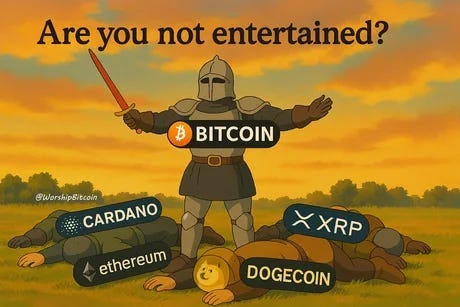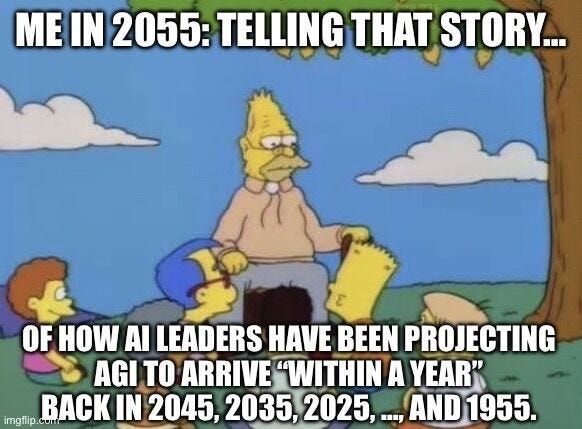What BofA Got Right (and Wrong) About Civilization's Greatest Disruptions
Hey there, Friends!
We're back at it again, cracking the code on all this financial stuff. Remember, we're in this together, breaking down the fancy jargon and making this whole money thing make sense. Swing by my Social Media - I keep the conversation going there with more insights and real-time updates.
This is a follow up on some thoughts I had as a continuation to my previous piece a few days ago.
When Bank of America released its "1000 Years of Technological Disruption" chart, it did something daring: it positioned Bitcoin as one of the 21 most important technological innovations in the last millennium. That alone deserves recognition.
But it also included items that felt like consumer fads, product iterations, or evolutionary improvements—not foundational disruptions. The kind that don't just shift markets—but change what it means to be human.
So I decided to rewrite the list.
Using the same constraint—21 items (a nod to Bitcoin's 21 million supply cap)—I’m presenting a new, more principled list of technologies that truly disrupted human civilization at scale.
This article will walk through what I agree with, what I disagree with, and what I believe should replace some of BofA's original picks.
What Bank of America Got Right
These entries from the original BofA chart absolutely earned their place. Each was a monumental leap:
Printing Press — Made mass communication, literacy, and decentralized knowledge possible. Arguably the root of every intellectual movement that followed. Without it, modern science, revolutions, and mass education may never have taken hold.
Telescope — Opened the heavens and advanced astronomy and physics. I include it as part of a broader category: Scientific Instruments. Without it, we would have remained blind to our place in the cosmos and slowed our understanding of planetary motion and physics.
Steam Engine — Sparked the Industrial Revolution, but I argue its impact is better captured through its applications (like railroads), which I highlight instead. Plus simple steam engines have existed far longer than 1000 years. Without it, mechanized industry and transportation would have stagnated.
Telegraph — The world’s first near-instant global communication system. Collapsed distance and gave rise to the modern news cycle, stock market coordination, and national infrastructure. According to Lyn Alden, it also broke gold as a form of money (I think she is right). Without it, information would still travel at the speed of horses and ships.
Polio Vaccine — A standout example of medical advancement. I generalize this to Germ Theory & Vaccination, capturing its broader transformational role in public health. Without vaccination, millions more would have suffered or died from preventable diseases.
Microprocessor — Foundation of modern computing. I include this in broader but related categories (transistor + personal computing). Without it, the digital era—from smartphones to spacecraft—would have never arrived.
World Wide Web — Absolutely foundational. I include it as part of the wider “Internet” disruption. Without it, the internet would remain an academic tool, not a global nervous system.
Social Media — Built on top of the internet, it rewired our attention, identity, and institutions. We now live, argue, vote, and revolt in public. Without it, public discourse would be far slower, and less globally reactive. It’s debatable if that’s a good thing or not.
Bitcoin — A monetary network that runs without rulers. Introduced the first digital scarcity. Trust-minimized property rights in cyberspace. It gives every human property rights and the ability to defend their property with minimal cost, while making the barrier to attack very cost prohibitive.
What I’m Cutting (and Why)
These were on BofA’s list—but didn’t meet the threshold for this one:
Model T / Hybrid Cars / EVs — Important evolutions, but not foundational. I’ve combined this to the automobile, as the true disruption.
iPhone — Powerful convergence device, but it’s not a new technology—it’s three old ones in a shiny shell.
DVD — A media format shift, not a societal one.
Word Processor — A convenience, not a civilization-changer.
Man on the Moon — Iconic and symbolic, but didn’t change daily life. Rocketry, not Apollo, is the disruption.
Light Bulb — Vital, but more a symbol of electricity’s adoption than a standalone disruption.
CRISPR — Astonishing potential, but not yet world-altering at scale. It moves to the “future” list.
AI (LLMs) — Powerful narrow tools, but AGI will be the true disruptor when/if it arrives.
Quantum Computing — Still theoretical in practice for now.
What I’m Inserting (and Why)
Here’s what made my version of the list—and why it belongs:
Double-Entry Accounting — Invisible but essential. Made scalable finance and capitalism possible. This has been the foundation for all finance for 700 years. Without it, global trade and corporate structures would have remained primitive and opaque.
Weaponization of Gunpowder — Transformed warfare and centralized state power. Ended the medieval world. You have guns or you have nothing. Without it, feudal castles and armored knights might still dominate battlefields. European influence across the globe would be far less significant.
Marine Chronometer — Solved the longitude problem. Enabled accurate global navigation and reliable transoceanic trade. Without this, global exploration and migration would have been slower, riskier, and far less transformative.
Scientific Instruments (Telescope + Microscope) — Unlocked the cosmos and the cell. Foundations of modern science. Changed the way we view ourselves in relation to the world around us. Without them, medicine, biology, and physics would have remained largely speculative.
Railroads — Enabled industrial expansion, regional connection, and the modern supply chain. Without them, economies would remain local and landlocked.
Motor Generator — The practical breakthrough that made electrical power usable and distributable, which enables everything from refrigeration to computers. Without it, there would be no power grid and no modern industry.
Modern Structural Steel — Allowed for vertical cities, massive bridges, and a new architectural paradigm. Without it, cities would still be low-rise and constrained.
Assembly Line — Made mass production and affordable consumer goods possible. Without it, industrial scale manufacturing and a consumer economy wouldn't exist.
The Automobile — Changed how we live, work, shop, and move. Reshaped cities and logistics. Without it, suburbs, personal travel, and decentralized commerce wouldn't exist.
Fission (Nuclear Energy & Weapons) — The power to destroy civilization—or power it. Reshaped geopolitics and existential risk. Without it, 20th century geopolitics and energy systems would look vastly different.
Rocketry — From ICBMs to satellites to GPS. The infrastructure of the space age. Without it, global navigation, space exploration, and telecom infrastructure wouldn't exist.
Transistor — The digital foundation. Enabled computing as we know it. Without it, modern electronics and computers would still be science fiction.
Personal Computing — Put software and processing power in every home. Revolutionized productivity. Without it, there would be no global connectivity or digital revolution at the individual level.
Mobile Phones — Real-time, always-on communication. Everyone is connected, everywhere, all the time. Without them, the modern economy and social fabric would be dramatically slower and more isolated.
The Final 21 Disruptive Innovations
Double-Entry Accounting (13th century Italy, particularly among Venetian merchants.)
Weaponization of Gunpowder (~1350 Europe)
Printing Press (1450 Gutenberg's movable type in Mainz)
Telescope & Microscope (mid 1600s)
Marine Chronometer (1761 John Harrison)
Railroads (1825 first public steam railway)
Telegraph (1837)
Motor Generator (~1867 Siemens)
Germ Theory & Vaccination (~ late 1800s)
Modern Structural Steel (1889 Eiffel Tower)
Airplane (1903 The Wright Brothers)
The Automobile (~1908 Ford Model T)
Assembly Line (1913, Henry Ford)
Rocketry (1942 V-2 launches to Sputnik 1)
Fission (1945 Trinity test & Hiroshima))
Transistor (1947 Bell Labs)
Personal Computing (1976 Apple I computer)
The Internet (1991 Tim Berners-Lee releases the first web page)
Mobile Phones (~1992)
Social Media (2003 Myspace)
Bitcoin (2009)
Future Disruptors (Not Yet, But Coming Fast)
CRISPR & Gene Editing — If fully realized, could eliminate disease, extend life, and reshape human evolution.
Artificial General Intelligence (AGI) — If achieved, it could change everything about work, cognition, and autonomy.
Quantum Computing — Still early, but may rewrite cryptography, simulation, and materials science.
Fusion Energy — Near-limitless clean energy. Breaks the resource ceiling for civilization.
What Did I Miss?
This is my take—one I hope does more than stir the pot. I want to start a better conversation about what actually changes the trajectory of humanity.
So now it’s your turn:
-What would you add or cut?
-What do you think BoA got right?
-What does Bitcoin really belong alongside?
Let’s sharpen this ledger together.
Reply, share, debate. Lets have it…
Well, that's a wrap for today y’all. If you found this helpful or it got you thinking, why not hit that 'like' button and share it with your buddies? The more we share, the more we all learn.
Disclaimer: The goal here is to educate and entertain. However, keep in mind, this isn't financial advice. I'm a regular person like you, sharing my perspectives based on my personal research and experiences. Always do your own research (DYOR) and make your own informed decisions.
Your thoughts and feedback on the content are always welcome. Feel like chatting about something? Reach out here or on Social Media, and let's start a conversation.
If you're viewing this in podcast notes, some embedded links might not be accessible. For the full experience and all the juicy links, head over to my Substack (lumberhawknews.substack.com).
Cheers!
If you would like to donate to support the Value for Value Bitcoin economy, below is my lightning wallet.













